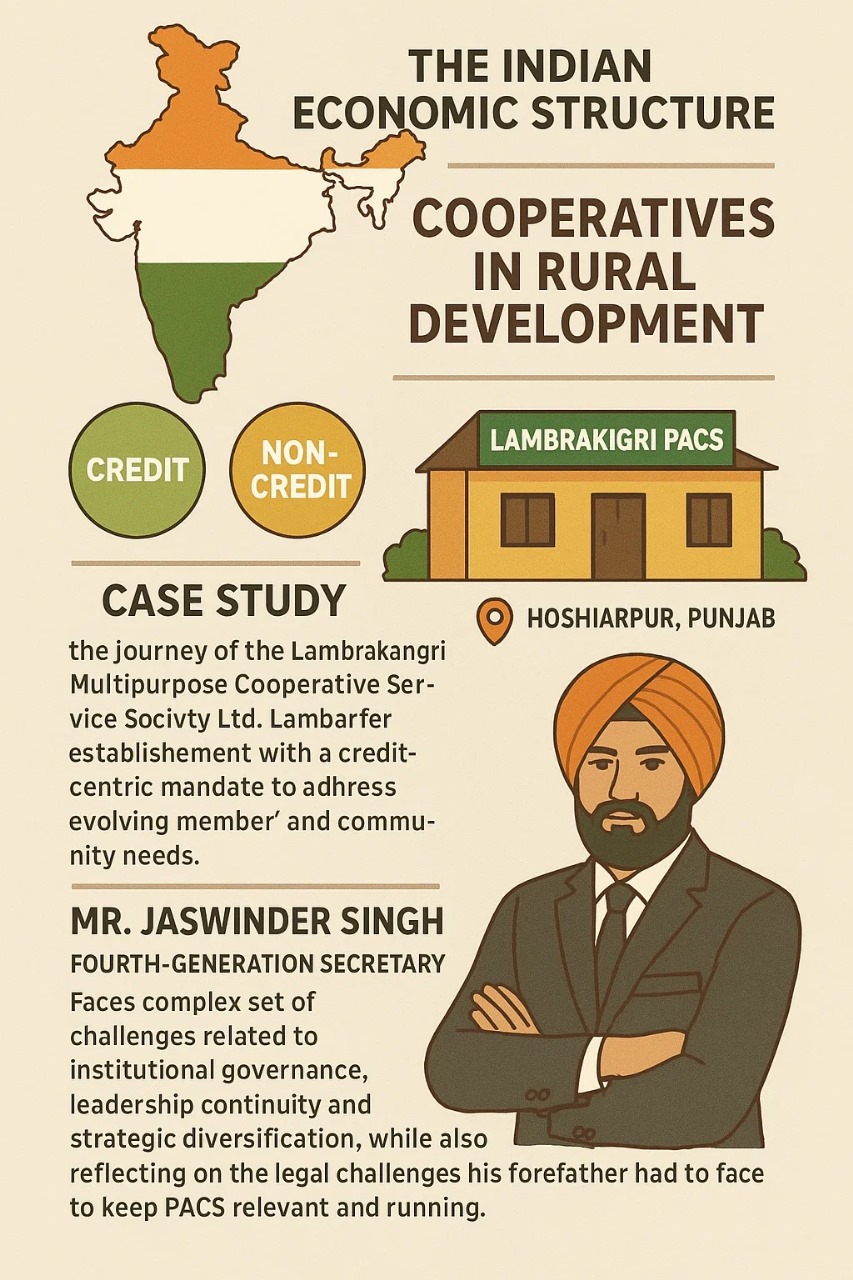
 Case Study
Case StudyBETWEEN RULES AND RELEVANCE: NAVIGATING GOVERNANCE, LEGITIMACY, AND INNOVATION AT LAMBRAKANGRI PRIMARY AGRICULTURAL CREDIT SOCIETY
Abstract: The Indian economic structure accommodates several business models, among which cooperatives play the most prominent role in rural development. Cooperatives are broadly classified into credit and non-credit categories . This case study highlights the journey of the LambraKangri Multipurpose Cooperative Service Society Ltd. (hereafter referred to as LambraKangri PACS ), a multipurpose Primary Agricultural Credit Society (PACS) based in LambraKangri village, Hoshiarpur district, Punjab (India).
Initially established with a credit-centric mandate, the LambraKangri PACS has significantly diversified its operations to address evolvingmembers' and community needs. Central to this narrative is Mr. Jaswinder Singh, the fourth-generation Secretary of the Society, who faces a complex set of challenges related to institutional governance, leadership continuity and strategic diversification, while also reflecting on the legal challenges his forefather had to face to keep the PACS relevant and running.
This case encourages readers to engage critically with issues of cooperative identity, strategic decision-making and institutional legitimacy. It highlights how the normative framework of cooperative values and principles serves as a foundation for exploring how rural cooperatives can remain relevant and resilient amid socio-economic and organisational transformation.
Learning Objectives
By the end of the session, students should be able:
• To examine the interface between the legal framework governing cooperatives and the evolving developmental expectations placed upon them by their members and communities
• To explore the strategic diversification of cooperative services to meet emerging needs while retaining their foundational purpose, values and member-centric identity
• To assess the integration of environmental sustainability into cooperative business strategies while maintaining financial viability and fulfilling community obligations
• To apply lifecycle approach to cooperative development and to foster analytical skills for identifying maturity, diagnosing stagnation and proposing pathways for democratic and strategic renewal
• To evaluate effectiveness of cooperative principles as practical and strategic tools in real-life cooperative functioning, including how they are applied, adapted or challenged during the cooperative’s growth and transformation
• Debate ethical and strategic trade-offs between compliance, responsiveness and innovation.
-
 Pub Date:30 Sep 2025
Pub Date:30 Sep 2025 -
 Source:ICRC
Source:ICRC -
 Discipline:Entrepreneurship & Startups / Innovations,Accounting / Banking & Financial Services
Discipline:Entrepreneurship & Startups / Innovations,Accounting / Banking & Financial Services -
 Product#:3093
Product#:3093 -
 Keywords:Rural cooperatives in India,Primary Agricultural Credit Society (PACS),Cooperative governance,Cooperative societies in Punjab,LambraKangri PACS case study
Keywords:Rural cooperatives in India,Primary Agricultural Credit Society (PACS),Cooperative governance,Cooperative societies in Punjab,LambraKangri PACS case study -
 Length:Pdf : 18 page(s) ,
Length:Pdf : 18 page(s) ,
 Case Study
Case Study